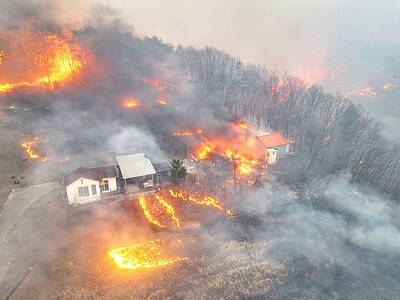Iran announced on Thursday it had agreed to share peaceful nuclear technology with Nigeria, aiming to help Africa’s biggest oil producer boost its electrical-generation output.
The head of the Iranian delegation said it was his country’s right to share its nuclear know-how with Nigeria. Mohammad Ali Zeyghami, a top commerce official, said fossil fuels would one day disappear and that it was crucial to develop clean energy.
“Nobody can limit the use of knowledge anywhere in the world,” Zeyghami said.
Tijanni Kaura, a senior Nigerian Foreign Ministry official, stressed that the agreement dealt only with power production and shouldn’t be misconstrued as an attempt to gain a nuclear weapons program.
“Nigeria is never entering into any agreement with Iran for any matter that has to do with weapons,” Kaura said.
“There shouldn’t be a misunderstanding between exploration or uses of energy to provide power and the uses of energy for weapons ... so that our relationship with Iran will not be misconstrued by Nigerians and the entire international community,” Kaura said.
Iran has refused to comply with repeated international demands to halt nuclear enrichment, a process that can be used to produce fuel for nuclear weapons or nuclear energy. The US suspects the country is trying to make weapons, but Iran says its only aim is power production.
Nigeria is Africa’s biggest petroleum producer, but neglect and corruption have left it with almost no way to refine crude oil into fuels used to power electricity-generating stations.
Most of the country’s 140 million inhabitants see only a few hours of state-provided electricity per day, and industry must rely on costly diesel generators to power plants.

A French-Algerian man went on trial in France on Monday for burning to death his wife in 2021, a case that shocked the public and sparked heavy criticism of police for failing to take adequate measures to protect her. Mounir Boutaa, now 48, stalked his Algerian-born wife Chahinez Daoud following their separation, and even bought a van he parked outside her house near Bordeaux in southwestern France, which he used to watch her without being detected. On May 4, 2021, he attacked her in the street, shot her in both legs, poured gasoline on her and set her on fire. A neighbor hearing

DEATH CONSTANTLY LOOMING: Decades of detention took a major toll on Iwao Hakamada’s mental health, his lawyers describing him as ‘living in a world of fantasy’ A Japanese man wrongly convicted of murder who was the world’s longest-serving death row inmate has been awarded US$1.44 million in compensation, an official said yesterday. The payout represents ¥12,500 (US$83) for each day of the more than four decades that Iwao Hakamada spent in detention, most of it on death row when each day could have been his last. It is a record for compensation of this kind, Japanese media said. The former boxer, now 89, was exonerated last year of a 1966 quadruple murder after a tireless campaign by his sister and others. The case sparked scrutiny of the justice system in

DITCH TACTICS: Kenyan officers were on their way to rescue Haitian police stuck in a ditch suspected to have been deliberately dug by Haitian gang members A Kenyan policeman deployed in Haiti has gone missing after violent gangs attacked a group of officers on a rescue mission, a UN-backed multinational security mission said in a statement yesterday. The Kenyan officers on Tuesday were on their way to rescue Haitian police stuck in a ditch “suspected to have been deliberately dug by gangs,” the statement said, adding that “specialized teams have been deployed” to search for the missing officer. Local media outlets in Haiti reported that the officer had been killed and videos of a lifeless man clothed in Kenyan uniform were shared on social media. Gang violence has left

‘HUMAN NEGLIGENCE’: The fire is believed to have been caused by someone who was visiting an ancestral grave and accidentally started the blaze, the acting president said Deadly wildfires in South Korea worsened overnight, officials said yesterday, as dry, windy weather hampered efforts to contain one of the nation’s worst-ever fire outbreaks. More than a dozen different blazes broke out over the weekend, with Acting South Korean Interior and Safety Minister Ko Ki-dong reporting thousands of hectares burned and four people killed. “The wildfires have so far affected about 14,694 hectares, with damage continuing to grow,” Ko said. The extent of damage would make the fires collectively the third-largest in South Korea’s history. The largest was an April 2000 blaze that scorched 23,913 hectares across the east coast. More than 3,000